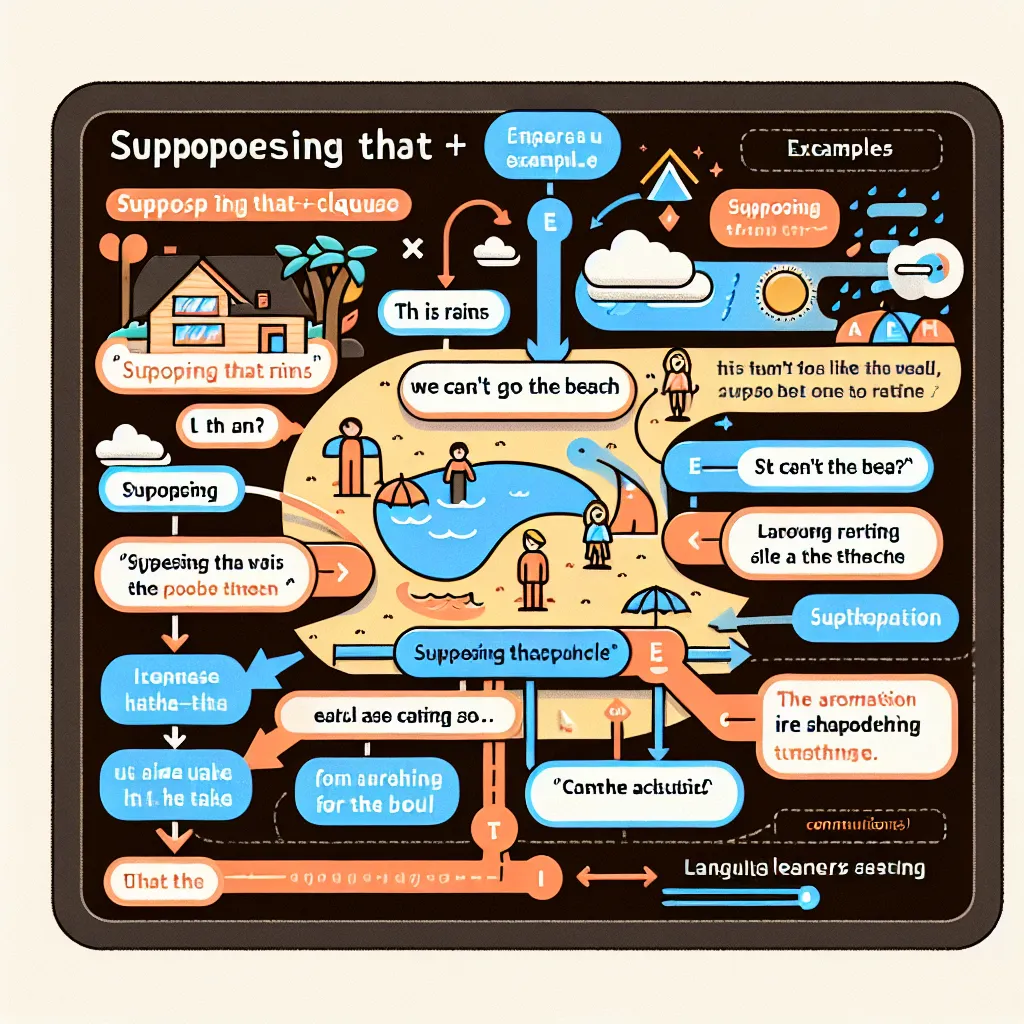The ‘supposing that + clause’ structure is a powerful tool for expressing hypothetical situations in English. In IELTS, this construction can elevate your language skills and help you achieve a higher band score. Let’s dive into the intricacies of this structure and explore how to use it effectively in your IELTS preparation and exam.

Understanding ‘Supposing that + clause’
The ‘supposing that + clause’ structure is used to introduce a hypothetical situation or condition. It’s similar to ‘if’ clauses but carries a slightly more formal tone, making it particularly useful in academic writing and speaking tasks in IELTS.
Formula and Grammar Rules
Formula: Supposing that + [clause], [result clause]
This structure typically follows this pattern:
- The ‘supposing that’ clause presents a hypothetical situation
- The result clause describes what would happen in that situation
Examples:
- Supposing that the weather improves, we will go for a picnic.
- Supposing that you had unlimited resources, how would you solve world hunger?
- Supposing that climate change continues at its current rate, what measures should governments take?
In these examples, the ‘supposing that’ clause sets up a scenario, and the main clause provides the consequence or question based on that scenario.
Applying ‘Supposing that’ in IELTS Writing
Task 2 Essay Writing
Using ‘supposing that’ can add sophistication to your essay writing. Here’s an example of how you might use it in an IELTS Writing Task 2:
“Supposing that all countries agreed to implement strict carbon emission regulations, the impact on global warming could be significantly reduced. This scenario, while currently hypothetical, illustrates the potential of united global action on climate change.”
Analysis: This sentence demonstrates a high level of language control. It presents a hypothetical situation (global agreement on carbon emissions) and its potential result (reduced impact on global warming). The use of ‘supposing that’ adds formality and sophistication to the argument.
Task 1 Report Writing
Although less common in Task 1, ‘supposing that’ can be used to discuss potential future trends:
“Supposing that the current growth rate continues, the population is projected to reach 10 million by 2050.”
Analysis: This sentence shows how ‘supposing that’ can be used to discuss potential future scenarios based on current data, which is particularly useful in trend analysis for IELTS Writing Task 1.
Enhancing IELTS Speaking with ‘Supposing that’
In the IELTS Speaking test, using ‘supposing that’ can demonstrate your ability to discuss hypothetical situations fluently:
Examiner: “How might your city change in the next 20 years?”
Candidate: “Well, supposing that our city continues to invest in green technology, I believe we could see a significant reduction in air pollution. Furthermore, supposing that the current trend of urban development persists, we might witness a transformation of our skyline with more high-rise buildings and modern architecture.”
Analysis: The candidate uses ‘supposing that’ twice to introduce hypothetical scenarios, showing a high level of language proficiency and the ability to speculate about future possibilities.
Advanced Usage for Higher Band Scores
To aim for Band 7 and above, consider using ‘supposing that’ in more complex sentence structures:
“Supposing that governments worldwide were to prioritize renewable energy sources over fossil fuels, not only would we see a dramatic decrease in carbon emissions, but we might also witness unprecedented innovation in clean technology sectors, potentially revolutionizing our approach to energy consumption and environmental preservation.”
Analysis: This complex sentence demonstrates advanced use of ‘supposing that’, combining it with other sophisticated structures like parallel clauses and modals of possibility. It shows a high level of grammatical range and accuracy, key criteria for achieving top band scores in IELTS.
Common Mistakes to Avoid
-
Incorrect verb tense:
Incorrect: “Supposing that he will arrive early, we can start the meeting.”
Correct: “Supposing that he arrives early, we can start the meeting.” -
Confusing with ‘suppose’:
Incorrect: “Suppose that you are the manager, what would you do?”
Correct: “Supposing that you were the manager, what would you do?” -
Overuse:
While ‘supposing that’ is useful, overusing it can make your language sound repetitive. Vary your hypothetical structures with alternatives like ‘if’, ‘in the event that’, or ‘should’.
Conclusion
Mastering the ‘supposing that + clause’ structure can significantly enhance your performance in IELTS. It allows you to express hypothetical situations with precision and formality, which is particularly valuable in Writing Task 2 and Speaking Parts 2 and 3. Remember to practice using this structure in various contexts, and always aim to balance it with other complex grammatical structures to showcase your full range of English language skills.
For further practice, try incorporating ‘supposing that’ into discussions about global issues, personal future plans, or potential scientific discoveries. These topics frequently appear in IELTS, and using this structure effectively can help you articulate your ideas more clearly and impressively.